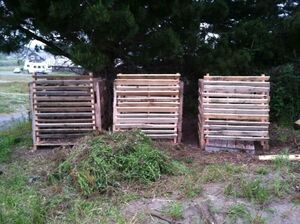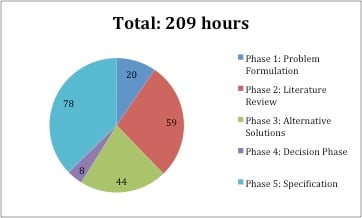
A rapid composting system was designed by Engr205 Introduction to Design Team 6 to find a better use for the green waste generated at the Humboldt Coastal Nature Center. Below is a detailed page on the process and cost of building the rapid compost system.
Problem Statement[edit | edit source]
The Friends of the Dunes invites volunteers every week to remove invasive plants in the Humboldt Coastal Nature Center. Each week, a volume of approximately 6'x6'x6' of green waste is generated and shipped off the site to be disposed of miles away. In an effort to manage the waste on site, rather than shipping it, this rapid composting system was designed.
Criteria[edit | edit source]
| Criteria | Weight | Constraint |
| Cost | 4 | Less than $400 |
| Ease of Use | 7 | Usable by untrained volunteers |
| Educational Value | 6 | At least volunteers learn more about rapid compost systems |
| Effectiveness | 9 | Must be able to process about 6'x6'x6' of yard waste every 14-21 days |
| Labor Intensity | 5 | Cannot require more maintenance than 1-2 times a week for 2-3 hours each day |
| Availability of Amendments | 2 | Bought locally and cheaply |
| Aesthetics | 6 | More professional than a tarp |
| Safety | 10 | Non-toxic and will not spontaneously combust |
| Durability | 8 | Stable for at least one year |
Description of Final Project[edit | edit source]
The rapid compost system is a three chamber compost bin with no mechanical parts. The structure is supported by wood beams and insulated with beach grass bales. To protect the insulating bales from wet weather, a hand mixed lime plaster seals the walls. The ground under the structure has been compacted thoroughly and covered with wood pallets to prevent the compost materials from contacting the earth. A roof will be slightly larger than the structure, and pitched at an angle, to keep rain from soaking through the plaster. Doors were made from donated wood that slides into place.
Materials Cost[edit | edit source]
| Materials | Quantity | Potential Cost | Our Cost |
|---|---|---|---|
| Pallets | 3 | $23.75/pallet | Donated |
| Beach Grass Bales | 18 | Free | Donated |
| Straw Bales | 18 | $9.12/bale | $9.12/bale |
| Lime Plaster | 48ft2 | $50.00 | $50.00 |
| Wood | twelve 2"x4"x4' | Free | Free |
| Nails and Wire Staples | 1lb | $2.49/lb | Donated |
| Chicken Wire | 48ft2 | $12.00 | $12.00 |
| Rebar | five 4' bars | $3.00/bar | $3.00/bar |
| Corrugated Sheet Metal | one 4'x15' sheet | Free | Free |
| Total with Beach Grass Bales | $161.24 | $86.00 | |
Design Cost
Figure 8: Time Invested
Update October 2017[edit | edit source]
Unfortunately the rapid compost system fell apart and is no longer available to compost green waste. An employee said that, "They were not used as often as they would have liked." It was also mentioned that, "They fell over and it was a eye sore."












